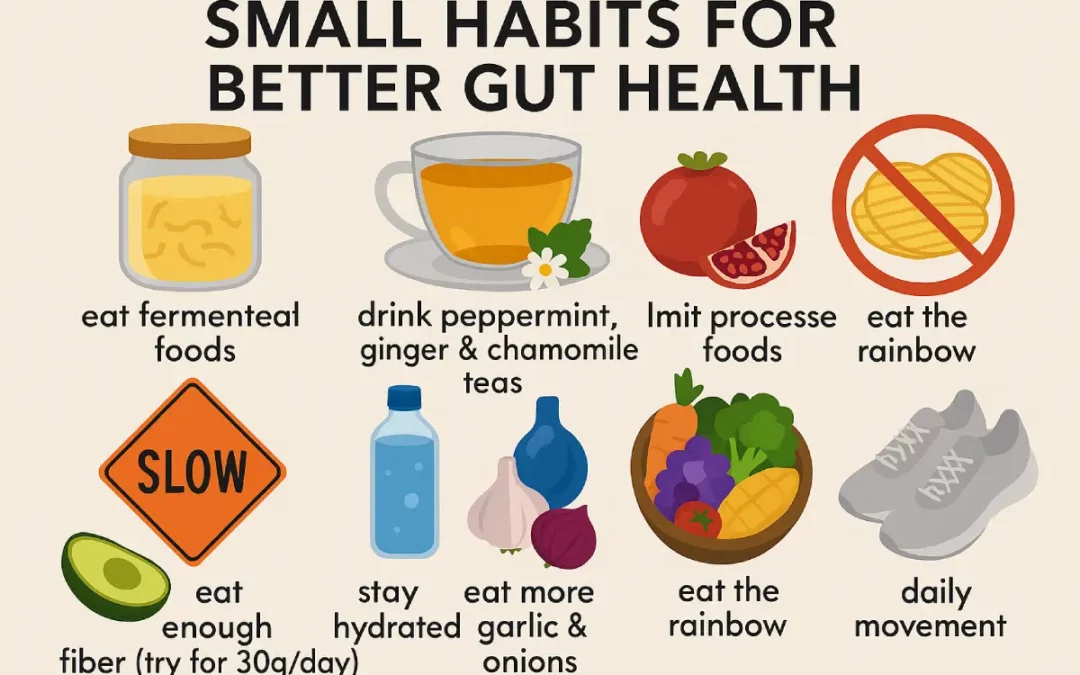Your gut health plays a major role in your overall well-being—from digestion and immune function to mental clarity and energy levels. In recent years, science has uncovered a deep connection between the gut microbiome (the trillions of bacteria living in your intestines) and nearly every other system in the body. Luckily, maintaining a healthy gut doesn’t require a dramatic lifestyle overhaul. It starts with small, consistent habits to improve gut health that can make a big difference over time.
This article breaks down 8 practical, evidence-supported habits you can implement today for better gut health. Whether you’re dealing with bloating, irregularity, or just want to optimize your digestion, these tips are for you.
What Is Gut Health and Why Does It Matter?
Gut health refers to the balance and function of bacteria, fungi, and other microorganisms in your digestive system. A healthy gut helps:
-
Break down and absorb nutrients
-
Regulate immune responses
-
Protect against harmful pathogens
-
Communicate with your brain via the gut-brain axis
-
Produce important vitamins (e.g., B vitamins and vitamin K)
When your gut is imbalanced (a state called dysbiosis), you may experience issues such as:
-
Gas, bloating, or constipation
-
Fatigue or brain fog
-
Food sensitivities
-
Skin conditions
-
Mood changes and anxiety
The good news? Supporting gut health is often a matter of adjusting your daily habits.
8 Small Habits That Improve Gut Health
1. Eat Fermented Foods Daily
Fermented foods are rich in probiotics, the beneficial bacteria that help populate your gut with the right microbial balance.
Examples of gut-friendly fermented foods:
-
Sauerkraut
-
Kimchi
-
Yogurt (with live cultures)
-
Kefir
-
Miso
-
Tempeh
-
Kombucha
Expert Insight: According to a study published in Cell, eating a diet rich in fermented foods increases microbiome diversity and decreases inflammation markers in the body.
2. Drink Herbal Teas (Peppermint, Ginger, Chamomile)
Certain herbal teas are natural digestive aids and help calm the gut lining.
Benefits of common digestive teas:
-
Peppermint tea: Relaxes intestinal muscles and relieves gas.
-
Ginger tea: Reduces nausea and promotes gastric emptying.
-
Chamomile tea: Soothes inflammation and supports sleep (indirectly boosting gut repair at night).
3. Limit Processed Foods
Highly processed foods often contain refined sugars, emulsifiers, and artificial additives that disrupt the gut microbiome and increase inflammation.
Watch out for:
-
Packaged snacks
-
Sugary cereals
-
Processed meats
-
Soda and energy drinks
Studies show that emulsifiers like polysorbate 80 and carboxymethylcellulose (found in processed foods) can trigger inflammation in the gut lining.
4. Eat Slowly and Mindfully
Chewing thoroughly and eating slowly aids digestion by:
-
Allowing enzymes in saliva to begin breaking down food
-
Reducing bloating and gas
-
Supporting the parasympathetic “rest and digest” response
Quick tips:
-
Take 20–30 minutes for a meal
-
Avoid screens while eating
-
Chew each bite 20–30 times
5. Stay Hydrated
Water is essential for digestion and nutrient absorption. It also supports:
-
Proper bowel movement
-
Mucosal lining integrity
-
Microbial balance
Daily hydration tips:
-
Aim for 2–3 liters per day
-
Add lemon or cucumber for variety
-
Drink herbal teas or mineral water if plain water is unappealing
6. Eat the Rainbow
A colorful variety of fruits and vegetables provides prebiotics (fiber that feeds good bacteria) and antioxidants that reduce gut inflammation.
Try to include:
-
Red: Tomatoes, beets, strawberries
-
Orange/Yellow: Carrots, bell peppers, oranges
-
Green: Leafy greens, broccoli, zucchini
-
Blue/Purple: Blueberries, eggplant, purple cabbage
Prebiotic powerhouses include asparagus, leeks, bananas (slightly green), and Jerusalem artichokes.
7. Eat More Garlic and Onions
These are natural prebiotics, rich in compounds like inulin and fructooligosaccharides that support healthy gut flora.
Other prebiotic-rich alliums:
-
Shallots
-
Scallions
-
Chives
Pro tip: Add raw or lightly cooked garlic and onions to meals daily for best results.
8. Incorporate Daily Movement
Physical activity improves digestion and helps maintain microbial diversity. Even light movement has proven benefits.
Gut-friendly movement ideas:
-
30-minute walk after meals
-
Gentle yoga or stretching
-
Cycling, swimming, or dancing
-
Strength training 2–3x/week
Studies suggest that exercise increases beneficial bacterial species such as Akkermansia muciniphila, linked to reduced inflammation and better metabolism.
Frequently Asked Questions About Gut Health
How fast can I improve my gut health?
Some changes (like bloating reduction) may be noticeable in a few days, but significant microbiome shifts typically take 2–4 weeks of consistent habits.
What is the best diet for gut health?
A whole-food, high-fiber, plant-rich diet with fermented foods, healthy fats, and lean proteins is ideal.
Do probiotics help?
Yes—especially if you’re recovering from antibiotics, travel, or gut imbalance. However, food-based probiotics (fermented foods) are often more diverse and sustainable long term.
Can stress affect my gut?
Absolutely. Chronic stress disrupts gut bacteria and increases intestinal permeability (“leaky gut”). Practice mindfulness, breathing exercises, and quality sleep to support your gut-brain connection.
Final Thoughts: Start Small, Stay Consistent
Improving your gut health doesn’t require a complicated protocol or a pantry full of supplements. The small habits highlighted in this guide—like drinking herbal teas, eating fiber-rich foods, and getting daily movement—create a strong foundation for a balanced microbiome and better digestion.
By making these lifestyle changes part of your daily routine, you’ll not only support your gut but also your immune system, mood, and long-term wellness.
Sources & References:
-
Sonnenburg, E. & Sonnenburg, J. (2019). The Good Gut. Penguin Books.
-
Zmora, N. et al. (2021). Personalized Gut Mucosal Colonization Resistance to Empiric Probiotics Is Associated With Unique Host and Microbiome Features. Cell.
-
National Institutes of Health: Human Microbiome Project
-
Harvard Health Publishing: “Understanding the gut-brain connection”
Read more info about gut health and microbiome!


